The question “where is the 234 country code” is a common one, often arising when people receive calls from unknown numbers beginning with this prefix. To answer this query definitively, let’s delve into the world of country codes and their significance.

What is a Country Code?
A country code is a numerical prefix used to identify a specific country when making international calls. It is essential for routing calls correctly to the desired destination. These codes are standardized by the International Telecommunication Union (ITU) to ensure global compatibility.
The Role of the 234 Country Code
The 234 country code is specifically assigned to Nigeria. This vast West African nation, known for its rich cultural heritage, diverse landscapes, and burgeoning economy, is the home to the 234 country code.
Nigeria: The Country Behind the 234 Code
Nigeria, a country of over 200 million people, is a dynamic and complex nation. Its influence extends far beyond its borders, making it a focal point for international trade, diplomacy, and cultural exchange.
Geographic Location of Nigeria
To understand Nigeria’s position better, it’s crucial to know its geographic location. Situated on the Gulf of Guinea in West Africa, Nigeria shares borders with Benin, Niger, Chad, and Cameroon. Its diverse terrain, ranging from coastal lowlands to the Jos Plateau, supports a variety of ecosystems and agricultural practices.
Nigeria’s Importance on the Global Stage
Nigeria plays a significant role in the global economy, particularly in the oil and gas sector. As Africa’s largest producer of crude oil, the country is a major player in the global energy market. Additionally, Nigeria is a cultural powerhouse, with a vibrant music industry (Afrobeats) gaining worldwide recognition.
Why Calls from the 234 Country Code Might Surprise You
It’s understandable to be curious about the origin of calls from the 234 country code, especially if you don’t have connections to Nigeria. Several factors can explain this:
Scam Alert: Be Wary of Unsolicited Calls
Unfortunately, scammers often utilize country codes, including 234, to mask their identity and appear more legitimate. These individuals may employ various tactics to deceive unsuspecting victims, such as claiming to be from government agencies, banks, or lottery organizations.
It’s essential to remain vigilant and avoid sharing personal or financial information with unknown callers, regardless of the country code.
Legitimate Business and Personal Connections
While many calls from the 234 country code might be fraudulent, it’s also possible that you’re receiving a call from a legitimate business or individual based in Nigeria. With the increasing globalization of business and personal relationships, it’s not uncommon to have contacts in different parts of the world.
Technological Advancements: VoIP and Virtual Numbers
The rise of Voice over Internet Protocol (VoIP) technology has made it easier for people to use phone numbers from different countries. This means that someone could be located anywhere in the world but use a Nigerian phone number for various reasons, such as business operations or customer support.
How to Verify the Caller
If you receive a call from the 234 country code and are unsure about its legitimacy, there are several steps you can take to verify the caller:
- Reverse Phone Lookup Services: These online tools can provide information about a phone number, including its location and potential owner.
- Contact the Company or Individual Directly: If you believe the call might be from a legitimate business or person, try contacting them using a verified phone number or email address.
- Be Cautious with Personal Information: Avoid sharing sensitive information with anyone unless you are absolutely certain of their identity.
Conclusion
The 234 country code is specifically assigned to Nigeria, a country with a rich history, diverse culture, and significant global influence. While many calls from this country code may be fraudulent, it’s essential to approach each call with caution and verify the caller’s identity before sharing any personal information.